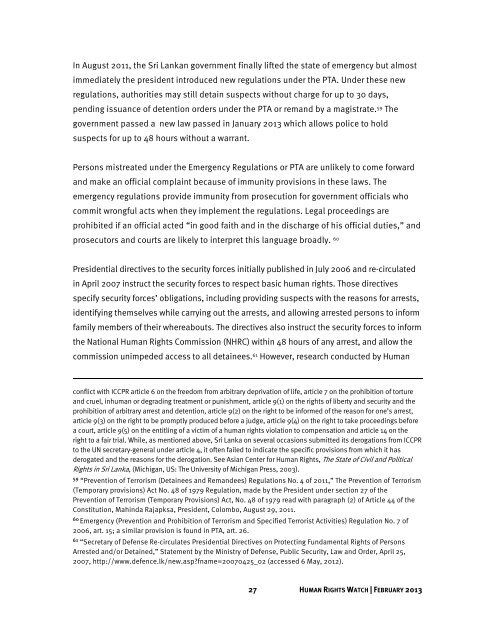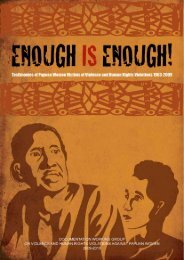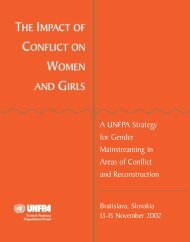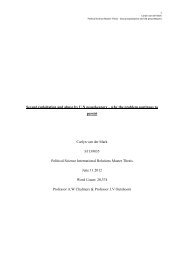Download the full report - Human Rights Watch
Download the full report - Human Rights Watch
Download the full report - Human Rights Watch
Create successful ePaper yourself
Turn your PDF publications into a flip-book with our unique Google optimized e-Paper software.
In August 2011, <strong>the</strong> Sri Lankan government finally lifted <strong>the</strong> state of emergency but almost<br />
immediately <strong>the</strong> president introduced new regulations under <strong>the</strong> PTA. Under <strong>the</strong>se new<br />
regulations, authorities may still detain suspects without charge for up to 30 days,<br />
pending issuance of detention orders under <strong>the</strong> PTA or remand by a magistrate. 59 The<br />
government passed a new law passed in January 2013 which allows police to hold<br />
suspects for up to 48 hours without a warrant.<br />
Persons mistreated under <strong>the</strong> Emergency Regulations or PTA are unlikely to come forward<br />
and make an official complaint because of immunity provisions in <strong>the</strong>se laws. The<br />
emergency regulations provide immunity from prosecution for government officials who<br />
commit wrongful acts when <strong>the</strong>y implement <strong>the</strong> regulations. Legal proceedings are<br />
prohibited if an official acted “in good faith and in <strong>the</strong> discharge of his official duties,” and<br />
prosecutors and courts are likely to interpret this language broadly. 60<br />
Presidential directives to <strong>the</strong> security forces initially published in July 2006 and re-circulated<br />
in April 2007 instruct <strong>the</strong> security forces to respect basic human rights. Those directives<br />
specify security forces’ obligations, including providing suspects with <strong>the</strong> reasons for arrests,<br />
identifying <strong>the</strong>mselves while carrying out <strong>the</strong> arrests, and allowing arrested persons to inform<br />
family members of <strong>the</strong>ir whereabouts. The directives also instruct <strong>the</strong> security forces to inform<br />
<strong>the</strong> National <strong>Human</strong> <strong>Rights</strong> Commission (NHRC) within 48 hours of any arrest, and allow <strong>the</strong><br />
commission unimpeded access to all detainees. 61 However, research conducted by <strong>Human</strong><br />
conflict with ICCPR article 6 on <strong>the</strong> freedom from arbitrary deprivation of life, article 7 on <strong>the</strong> prohibition of torture<br />
and cruel, inhuman or degrading treatment or punishment, article 9(1) on <strong>the</strong> rights of liberty and security and <strong>the</strong><br />
prohibition of arbitrary arrest and detention, article 9(2) on <strong>the</strong> right to be informed of <strong>the</strong> reason for one’s arrest,<br />
article 9(3) on <strong>the</strong> right to be promptly produced before a judge, article 9(4) on <strong>the</strong> right to take proceedings before<br />
a court, article 9(5) on <strong>the</strong> entitling of a victim of a human rights violation to compensation and article 14 on <strong>the</strong><br />
right to a fair trial. While, as mentioned above, Sri Lanka on several occasions submitted its derogations from ICCPR<br />
to <strong>the</strong> UN secretary-general under article 4, it often failed to indicate <strong>the</strong> specific provisions from which it has<br />
derogated and <strong>the</strong> reasons for <strong>the</strong> derogation. See Asian Center for <strong>Human</strong> <strong>Rights</strong>, The State of Civil and Political<br />
<strong>Rights</strong> in Sri Lanka, (Michigan, US: The University of Michigan Press, 2003).<br />
59<br />
“Prevention of Terrorism (Detainees and Remandees) Regulations No. 4 of 2011,” The Prevention of Terrorism<br />
(Temporary provisions) Act No. 48 of 1979 Regulation, made by <strong>the</strong> President under section 27 of <strong>the</strong><br />
Prevention of Terrorism (Temporary Provisions) Act, No. 48 of 1979 read with paragraph (2) of Article 44 of <strong>the</strong><br />
Constitution, Mahinda Rajapksa, President, Colombo, August 29, 2011.<br />
60<br />
Emergency (Prevention and Prohibition of Terrorism and Specified Terrorist Activities) Regulation No. 7 of<br />
2006, art. 15; a similar provision is found in PTA, art. 26.<br />
61<br />
“Secretary of Defense Re-circulates Presidential Directives on Protecting Fundamental <strong>Rights</strong> of Persons<br />
Arrested and/or Detained,” Statement by <strong>the</strong> Ministry of Defense, Public Security, Law and Order, April 25,<br />
2007, http://www.defence.lk/new.asp?fname=20070425_02 (accessed 6 May, 2012).<br />
27 HUMAN RIGHTS WATCH | FEBRUARY 2013




![IANSA [PDF, 2MB] - PeaceWomen](https://img.yumpu.com/25206379/1/190x123/iansa-pdf-2mb-peacewomen.jpg?quality=85)
![Commitments Sample [PDF, 93KB] - PeaceWomen](https://img.yumpu.com/25206331/1/190x245/commitments-sample-pdf-93kb-peacewomen.jpg?quality=85)










![A Toolkit for Advocacy and Action [PDF, 260KB] - Peace Women](https://img.yumpu.com/25205989/1/190x245/a-toolkit-for-advocacy-and-action-pdf-260kb-peace-women.jpg?quality=85)